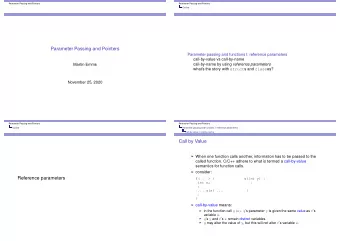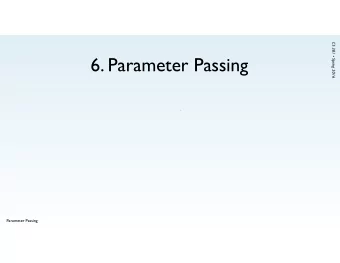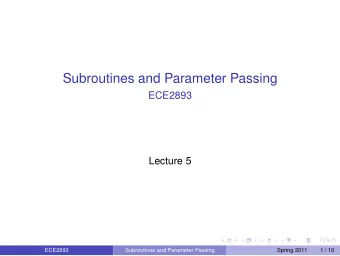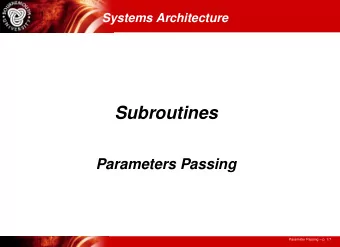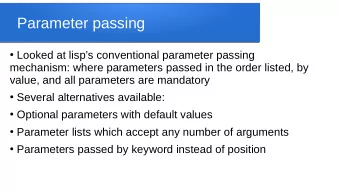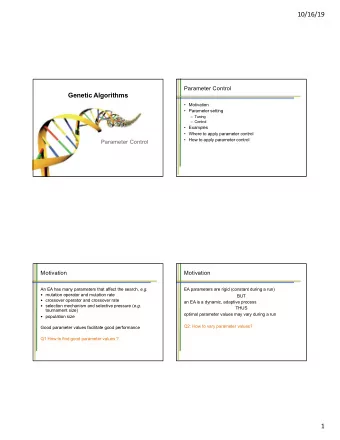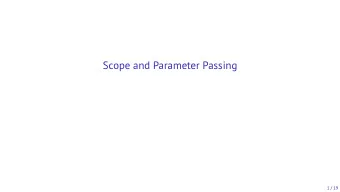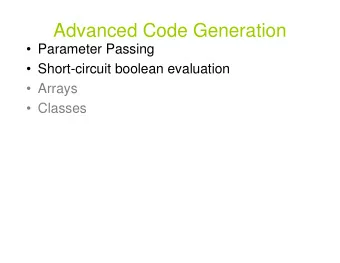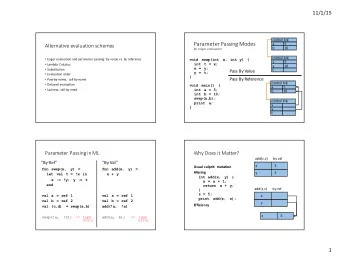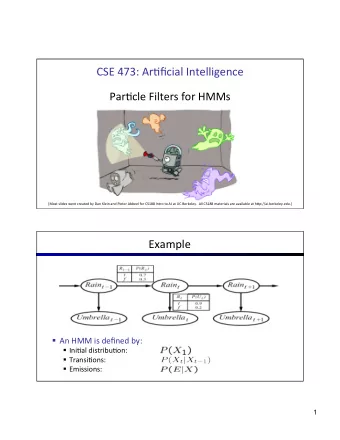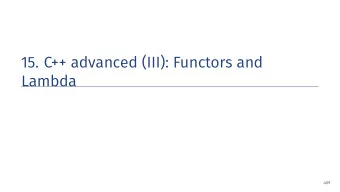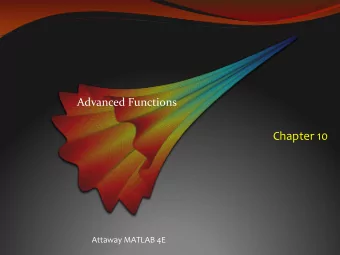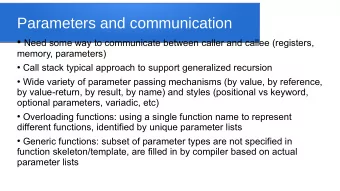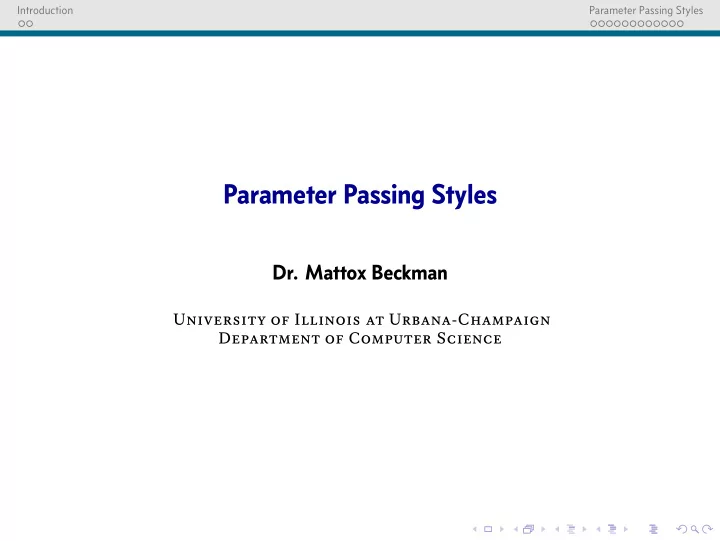
Parameter Passing Styles Dr. Mattox Beckman University of Illinois - PowerPoint PPT Presentation
Introduction Parameter Passing Styles Parameter Passing Styles Dr. Mattox Beckman University of Illinois at Urbana-Champaign Department of Computer Science Introduction Parameter Passing Styles Objectives You should be able to... The
Introduction Parameter Passing Styles Parameter Passing Styles Dr. Mattox Beckman University of Illinois at Urbana-Champaign Department of Computer Science
Introduction Parameter Passing Styles Objectives You should be able to... The function call is one of the most fundamental elements of programming. The meaning of a function call is greatly affected by the choice of parameter passing style. ◮ Understand fjve kinds of parameter passing: 1. Call By Value 2. Call By Reference 3. Call By Name 4. Call By Result 5. Call By Value-Result
let foo x y z = x := z * z * y; (* let's pretend that this *) y := 5; (* is legal *) x + y let main () = let a = 10 in foo a b (a+b) Introduction Parameter Passing Styles Running Example We will use the following code to illustrate the concepts: let b = 20 in
Main > let pi1 a b = a pi1 : a -> b -> a Main > let foo () = pi1 5 (foo ()) foo : () -> Int Main > foo () Stack overflow during evaluation (looping recursion?). Introduction Parameter Passing Styles Call By Value ◮ Parameters are evaluated before the function call takes place. ◮ The function receives a copy of the parameters. ◮ Changes made to variables in the function are not visible outside. ◮ Advantages: speed ◮ Disadvantage: instability
foo a b (a+b) let foo x y z = x := z * z * y; y := 5; x + y let main () = let a = 10 in Introduction Parameter Passing Styles Result of CBV let b = 20 in ◮ a is copied into x . ◮ b is copied into y . ◮ a+b is evaluated to 30, the 30 is copied into z . ◮ x is assigned 30 * 30 * 20. ◮ y is assigned 5. ◮ upon return, a and b have their original values. ◮ This is used by C, C++, OCaml, …“most languages”.
Introduction Parameter Passing Styles Call By Reference ◮ Parameters are evaluated before the function call takes place. ◮ The function receives a copy of the parameters. ◮ Variables are passed as pointers. ◮ Changes made to variables in the function are visible outside. ◮ Advantages: speed, saves some memory, side effects are possible when you want them. ◮ Disadvantage: side effects are possible when you don’t want them.
let foo x y z = x := z * z * y; y := 5; x + y let main () = let a = 10 in let b = 20 in foo a b (a+b) Introduction Parameter Passing Styles Result of Call by Reference ◮ a and x share the same memory. ◮ b and y share the same memory. ◮ a+b is evaluated to 30, the 30 is copied into z . ◮ x and a are assigned 30 * 30 * 20. ◮ y and b are assigned 5. ◮ upon return, a and b have new values. ◮ Used by C, C++, OCaml optionally; Java by default.
int inc( int i) { return ++i; } int main() { int i = 10; } Introduction Parameter Passing Styles Example cout << inc(i) << " " << i << endl; What will be the output of this code?
int inc( int &i) { return ++i; } int main() { int i = 10; } Introduction Parameter Passing Styles Example cout << inc(i) << " " << i << endl; What will be the output of this code?
Introduction Parameter Passing Styles Call By Result ◮ Parameters are updated before the function call returns . ◮ Often combined with call by value. Call by result, call by value, and call by value-result are “subclasses” of call-by-copy. What changes is when the copy occurs. ◮ Changes made to variables in the function are visible outside—in fact, that’s the whole point. ◮ Advantages: you can return multiple values from a single function ◮ Disadvantages: variables can be clobbered inadvertently.
foo a b (a+b) a + b let main () = let a = 10 let b = 20 let foo x y z = x := z * z * y; y := 5; Introduction Parameter Passing Styles Result of Call By Result ◮ a is copied into x . ◮ b is copied into y . ◮ a+b is evaluated to 30, the 30 is copied into z . ◮ x is assigned 30 * 30 * 20. ◮ y is assigned 5. ◮ a + b will evaluate to 30 ◮ upon return, x is copied into a , and y is copied into b . ◮ This is used by Prolog. (Sort of...)
pi1 : a -> b -> a Main > let pi1 a b = a Main > let foo () = pi1 5 (foo ()) foo : () -> Int Main > foo () 5 Introduction Parameter Passing Styles Call By Name ◮ Parameters are evaluated after the function call is made. ◮ The parameters are substituted into the function body. ◮ Advantages: stability ◮ Disadvantage: ineffjciency — computations can be duplicated
let foo x y z = x * x + y * y let main () = foo (10+10) (20+20) (main ()) Introduction Parameter Passing Styles Result of Call By Name ◮ x is replaced by (10+10) . ◮ y is replaced by (20+20) . ◮ z is replaced by (main ()) . ◮ The call to main via z never happens. ◮ The + operation happens fjve times. ◮ This was used by Algol. Also used by some “term rewriting” systems.
pi1 : a -> b -> a Main > let pi1 a b = a Main > let foo () = pi1 5 (foo ()) foo : () -> Int Main > foo () 5 Introduction Parameter Passing Styles Call By Need ◮ Parameters are encapsulated into a thunk . ◮ The thunks are passed into the function. ◮ The fjrst time a thunk is executed, the value is cached. ◮ Remaining executions use the cached value. ◮ Advantages: stability ◮ Disadvantage: effjcient, but sensitive to order.
let foo x y z = x * x + y * y let main () = foo (10+10) (20+20) Introduction Parameter Passing Styles Result of Call By Need ◮ x is replaced by a pointer to (10+10) . ◮ y is replaced by a pointer to (20+20) . ◮ z is replaced by a (main ()) pointer to (main ()) . ◮ The call to main via z never happens. ◮ The + operation happens only once for each variable. ◮ This is used by Haskell. Also known as lazy evaluation . ◮ Not compatible with assignment.
Recommend
More recommend
Explore More Topics
Stay informed with curated content and fresh updates.
